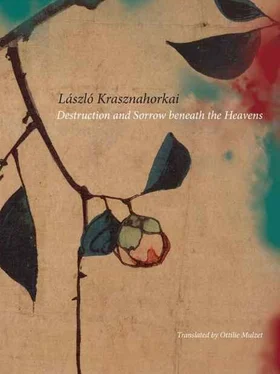Because from this point on, what occupies their minds, most unconditionally Stein’s mind, is the question: Why did Tang Xiaodu send them here to Suzhou? No matter what he sees, no matter where he goes, no matter who he meets, he is unable to give himself over to what he sees, where he goes and to whom he speaks; because he continually looks and listens in such a way that he must always decipher what must be deciphered, so that he will not fail to notice, if it happens to come before him, that garden, that street, that person, because of which Tang Xiaodu — or happenstance, or the inscrutable workings of fate — has led him here, in the form of the quiet but determined recommendation of Tang Xiaodu.
The next day, one of Tang Xiaodu’s friends is waiting for them, the kind of middle-aged man of whom one could think many things, just not that he is a poet — which however, he is — Tang Xiaodu prepared them for this; a poet, moreover, of Suzhou, one with great influence on contemporary Chinese literature, Xiao Hai, awaits them in a clumsily elegant modern conference centre, part of the world of New China; he is able to make some time for a conversation with Stein during a break in a literary historical conference taking place there. He creates the impression of a tense, very busy person, continually stealing a glance at his watch, someone who always unfortunately has to be rushing off, but he does not seem like a poet with great influence on his contemporaries; he seems instead a functionary, moreover a petty functionary, whose contemporaries have great influence over him, and, as it emerges during the introductions, it really is that way, he has taken up an official post, and because of that, even with the best of intentions, he could be designated a so-called functionary-poet, clearly he got into this so that he could earn a living somehow, but it’s as if the entire thing doesn’t sit well with him, there is within him some sense of misfortune, something ungainly — instead of an inner tranquillity of the poet, there is the inner nervousness of the official — still, they listen to him attentively in the huge conference centre, somewhere in a hotel room on the first floor, where they sit on the bed, and after hearing from the interpreter why László Stein is here, he embarks on a monologue, and leaves no doubts that he has neither desire nor time for a dialogue, nor is he of that disposition, he is a person of long explanations, presenting his train of thought thoroughly; serious, and deliberate, for as long as he sits there on the edge of the bed in this hotel room, he chooses his words carefully, the air trembles from his nervousness and impatience, clearly he has to get back, back to the conference room from where he sneaked out for their sake, so that perhaps it also bothers him that he may not express himself with complete thoroughness but only very succinctly, clearly he is forced to formulate his thoughts with much, too much succinctness. He does not look at Stein while he speaks. He creates something of the impression of a person who always feels that a great crowd is listening to his words — even if he is sitting on the edge of the bed in a hotel room, trying into summarize in a mere half hour, in answer to the questions of a foreigner, what he thinks of the current position of classical culture.
xiao hai. Since the 1990s, the Chinese have had to turn back to their own cultural past more and more. In the 1880s and 90s, when Chinese artists confronted European art and the European world for the first time, it had a huge effect on them: they took a lot from that world, and they began to imitate it — but I have to say that, looking at it from here, it was more on a formal level, not on a spiritual level. In more than one instance this encounter took place amid great disaccord, namely, that there, on one side, was an extraordinarily significant, modern and, for us, radically new artistic point of view — the European — whereas here, on the other side, we had our culture, and many felt that to abandon it, to allow it to perish, was not permissible. My viewpoint is as follows: I know and respect European culture, but I consider the study of the classical Chinese texts to be more important. Because the fundamental question is not what we will do with European influence, how we will amalgamate it with our own traditional culture — as the issue is formulated today, on the level of banalities — no, that is not the essential thing at all. The essential thing is that I, the poet who has been hopelessly wandering around in this conflict for who knows how long, should be able to find my own path.
There are an extraordinary number of explanations as to what is classical, traditional Chinese culture, that of which we are now speaking, but none of them are interesting. Now, for example, for almost a week, I’ve been sitting at this conference where the discussion is about the unification of modern and classical literature and the crisis regarding this, but I am bored, bored to death, because it’s actually very simple, no conference is needed, it is completely obvious that classical culture is nothing but the personal path which leads to it. Culture, then, only truly becomes culture when it is embodied in someone.
These days, many scholars are engaged in the task, completely superfluously, of comparing Eastern and Western culture. We, too, are doing the same thing, here in this building. But this can only lead to a formal result, and in the meantime the essence is lost. Because culture is a living thing, something that appears within me, within a person. It’s just that tradition, which becomes a living tradition within someone, is not the same thing as that which corresponds to the so-called formal criteria of this tradition.
He sits slightly hunched on the bed, then becomes tired in this posture as well, so he puts his two hands behind him and, leaning on them, stretches out a little.
xiao hai. The teachings of Confucius ( he continues his monologue ) was a profound assembly of the general stipulations relating to personal moral behaviour. It has lost its validity in the China of today. The China of today is not built upon moral principles. For example, the most fundamental Confucian command, that the rulers and the leaders must demonstrate their virtuousness by example, is not at all characteristic of the political life of today, and so no one understands any more what it means when Confucius says that the rulers and the leaders do not lead the country with their decisions, neither with their will, nor with their intentions, but with morality. The principles of the Lunyu are dead today. And this is the most significant collection of moral principles. I mention this because in the Lunyu , and what came afterwards, the Confucian tradition understands something completely different by the term ‘morality’. Today, morality represses something in people: crime, mistakes, sins. But this is not at all what is meant by morality in Confucianism. In Confucianism, morality serves personal human fulfilment.
I see the position of modern art as tragic, because I see the position of the modern artist as tragic in contemporary society. The modern artist no longer bears within himself that hidden or manifest goal — clearly originating from an ancient mandate — of demonstrating, in his life and in his work, how a person can become, through the means of morality, humane: how he can become ren .[185] It is important to know that, in the Confucian tradition, morality was an aesthetic criterion: for Confucius, a work was beautiful that taught one the good. In contrast, contemporary art is floundering in various muddied formal objectives, and, as far as I can judge, in Europe the situation is the same. As if it were possible to elevate, among the most fundamental factors of these works, one of them — the aesthetic — and simply renounce the others, the most essential: the criterion of morality. In my opinion, this is partially the reason for the general trend by which the readership of high literature has radically dropped. And this is also the reason for poetry having lost its leading role.
Читать дальше












